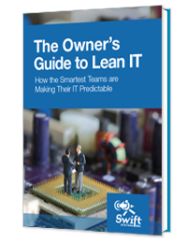The 7 Deadly IT Sins and How Can You Avoid Committing Them?
We’re all guilty of sinning at some time in our lives, but for the most part, we try to live a guilt-free, good life. The problem is when we don’t know or understand that what we are doing is a sin, and this applies very directly when we come to look at common behaviors and misconceptions with our IT infrastructure.
It isn’t just end users we are concerned with here – it is IT managers and practitioners too. In most instances, awareness of the current risks is just not there or appreciated strongly enough, while in others, a degree of complacency is allowed to set in because a solution that may have been ideal at the time was deployed, but today it is no longer effective protection.
We’re going to perform a swift fly by of the 7 Deadly IT Sins today, and for those interested, we’re also going to be arranging a webinar to delve into them a little more deeply – the invitation to register is below and we’ll also be arranging some goodies for some lucky attendees:
The 7 Deadly IT Sins are:
Mobile Negligence: hackers are targeting mobile devices like never before and last year there was a 1,800% increase in Android malware (according to Sophos). Increasingly, corporate data is the target as hackers discover the value in your information beyond what is simply stored on the device – now
mobile devices can provide access into the heart of your network.
Mac Malice: claiming to be running a Mac environment is no protection in a world dominated by Windows PCs – most threats are directed at Windows, because of its popularity, however Mac exploits have risen substantially too. Macs can also play host to Windows exploits as well, so while people may love their Macs, remember, so do hackers.
Unsecure Wi-Fi: if your hotspot provides access to the corporate network, you are inviting anyone with any mobile device, no matter who controls it, where it has been, or what it contains, to skip over the garden gate and come straight up to your network’s front door and even into your home. Make sure your wireless network is secure!
Un-encrypted Email: un-encrypted email is like sending a letter through the US Mail in a Ziploc baggy – anyone can read what you send and see the contents – they only have to look. We are so comfortable with email as a communication tool, we do not think twice about sending sensitive information using it, e.g. credit card information, document and data files, sensitive company and personal information. Would you send your SSN on a piece of paper sealed in a transparent envelope? I didn’t think so!
Faulty Firewall: a firewall is like a nightclub security guard – your first line of defense to keep nasty characters out of your network. Firewalls block scans, act as a bandwidth allocation tool for company applications using the Internet, and are always on the lookout for malware. They have a complex job to perform, but what if they are overloaded, or have not been optimized for the work they are currently performing, or are simply too out of date for the task they must perform?
Un-encrypted Files: just like un-encrypted email, if you do not encrypt your files then they are open to anyone who can gain access to them. You may think this can’t happen to you, but if it can happen to Target, JPMorgan Chase, and the US Government which recently lost 22 million government and military personnel records, it can happen to you. It happens to small businesses all the time – sometimes they don’t realize it, sometimes they do, but because they are small the issue is not a news event. The fact is it will happen to you – it’s just a case of when, and will your data be protected or not when it does.
Delinquent Web Filtering: we used to just block anything to do with porn or gambling, but now it is so difficult to block the websites which are the common sources of malware and infections because 80% of all malicious web-based attacks are now hosted on perfectly legitimate sites. You can get infected from a website you have visited every day for the last 10 years, and it was perfectly safe to do so – until today – today, it got hacked and now, it’s infecting you just for visiting.
These are the 7 Deadly IT Sins – if you are looking for absolution, call us today and we’ll help you to save yourself.

IT systems are foundational to modern businesses. Too often, that foundation is unsteady. Unpredictable outages, insecure networks, and unreliable performance from mission-critical systems can jeopardize your entire business.
There’s a better way. Learn how.
Get in touch with us for a free consultation with one of our technical experts. We’ll review your current systems, assess your needs, and identify the coverage options to best meet them.
Get in touch with us by phone:


